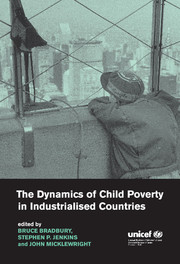Book contents
- Frontmatter
- Contents
- List of figures
- List of tables
- Notes on the contributors
- Acknowledgements
- 1 Beyond the snapshot: a dynamic view of child poverty
- Part I Issues and cross-national evidence
- 2 Conceptual and measurement issues
- 3 Child poverty across twenty-five countries
- 4 The dynamics of child poverty in seven industrialised nations
- Part II Topics in child poverty dynamics
- Summary and policy conclusions
- Index of authors
- Index by subject
3 - Child poverty across twenty-five countries
Published online by Cambridge University Press: 02 December 2009
- Frontmatter
- Contents
- List of figures
- List of tables
- Notes on the contributors
- Acknowledgements
- 1 Beyond the snapshot: a dynamic view of child poverty
- Part I Issues and cross-national evidence
- 2 Conceptual and measurement issues
- 3 Child poverty across twenty-five countries
- 4 The dynamics of child poverty in seven industrialised nations
- Part II Topics in child poverty dynamics
- Summary and policy conclusions
- Index of authors
- Index by subject
Summary
Introduction
The dynamic view of poverty and living standards over time offers a dimension of understanding that simple ‘snapshots’ cannot provide. However, in many countries this dynamic perspective is not available. In this chapter, therefore, we begin the book's empirical analysis with a gallery of snapshots of child poverty across the industrialised world. We present recent evidence on variations in child poverty across industrialised countries and assess the contributions of family structure, state transfers and market incomes to this variation. How much does child poverty vary across countries, and what causes this variation?
The results here are based on data from the Luxembourg Income Study (LIS) which, at the time of writing, covers some twenty-five industrialised countries, many with information for several years. We use almost all these data in the results presented here. This wide focus means that we cannot do justice to specific circumstances in each country. Instead, the objective is to look at the general patterns of variation in child poverty outcomes across the industrialised world. The countries examined include most of the OECD, several of the important non-OECD economies of Eastern Europe (including Russia) and one representative of the newly industrialising countries of East Asia (Taiwan).
Our results complement those in the other chapters in this volume in several respects. Longitudinal data often differ in important ways from cross-sectional data.
- Type
- Chapter
- Information
- Publisher: Cambridge University PressPrint publication year: 2001
- 17
- Cited by



